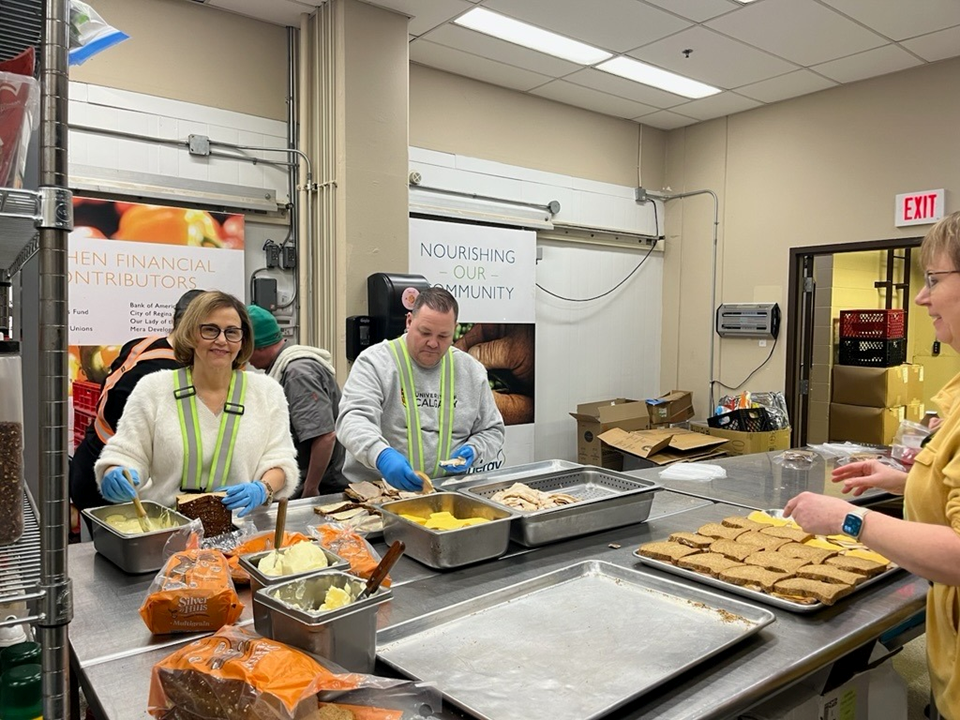REGINA - The Dream Community Foundation (DCF) has partnered with the Regina Food Bank to support their School Food Program.
DCF is a charity that that aims to fund three of its pillars: eat together, play together and grow together, said Runa Whitaker, executive director of DCF.
The charity first collaborated with the Regina Food Bank after the DCF Sask. marketing manager approached Sinéad Moran, community ambassador at DCF, about doing the winter wonderland event alongside the food bank.
Moran explained they thought it wasn’t the right fit for the DCF, whose purpose is more to serve the broader community.
Moran later met with Evelyn Cerda, vice-president of impact & partnerships with the food bank, to discuss what other programs the non-profit group offers the community.
After Cerda sent a proposal about the work they're doing with the School Food Program, DCF felt it would be "a really good fit with our own pillars."
So, DCF is currently contributing a portion of the $25 million they are receiving from the Cooper family over the next few years towards the School Food Program.
Children in Need
According to the Regina Food Bank, one in five children across Sask. are affected by food insecurity. up over the past few years. Additionally, 39 per cent of the food bank’s approximate 20,000 clients are children. This continues to raise the need for a Food School Program.
Cerda mentioned it currently serves 2,000 students every week across eight different schools and two community school programs.
Included in the initiative is a lunch program, where the food bank will prepare meals for partnered schools three times a week. These food items include fruit, granola bars and sandwiches.
Members of the DCF recently had a chance to participate in the program by helping prepare meals. Moran mentioned "around 700 sandwiches were made by quite a small team that was really dedicated to the cause."
The food bank also prepares a snack box for kids so they can eat food during the evenings or weekends, too, said Cerda.
During the summertime, the food bank offers "a summer program which gives them food hampers, said Cerda. She added, "[just] because they're in school, the food insecurity challenge doesn't go away."
it helps support their cognitive function, which leads to improved memory, problem-solving, attention and more.
Cerda mentioned schools have told the food bank that they’ve seen children’s learning ability improve after they joined the program.
Additionally, students' attendance has improved on the days they’re handed food, "which shows they’re not at home or getting in trouble," said Cerda. Students' are also showing more excitement from being at school based on what teachers have seen.
On the financial side, with the money received from DCF, Cerda noted, "[this] helps us cover for some of those expenses [with the program]. And so we can reallocate some of those dollars to provide more food to new clients."
Speaking of money, the food bank had been waiting on mail-in donations from the Canada Post strike, which Cerda said affected their target numbers for Dec., which is one of the bigger months for them.
While the food bank did get some mail-in donations in Jan., Cerda said it’s accurate to say the food bank will likely not receive a lot of the donations. Because of this, the food bank lost nearly $200,000, and they aren't sure about how long it will take to make up that financial loss.
Even with those challenges, the food bank is aiming to eventually expand its food school program.
Cerda wouldn’t say which schools they would partner with next, but she did note "food insecurity affects everyone. And it doesn't matter which end of the city you live in or which area you might be facing food insecurity. And so for us, it’s important to work with the schools so they can identify if they have that need. And then we can provide them with food."




